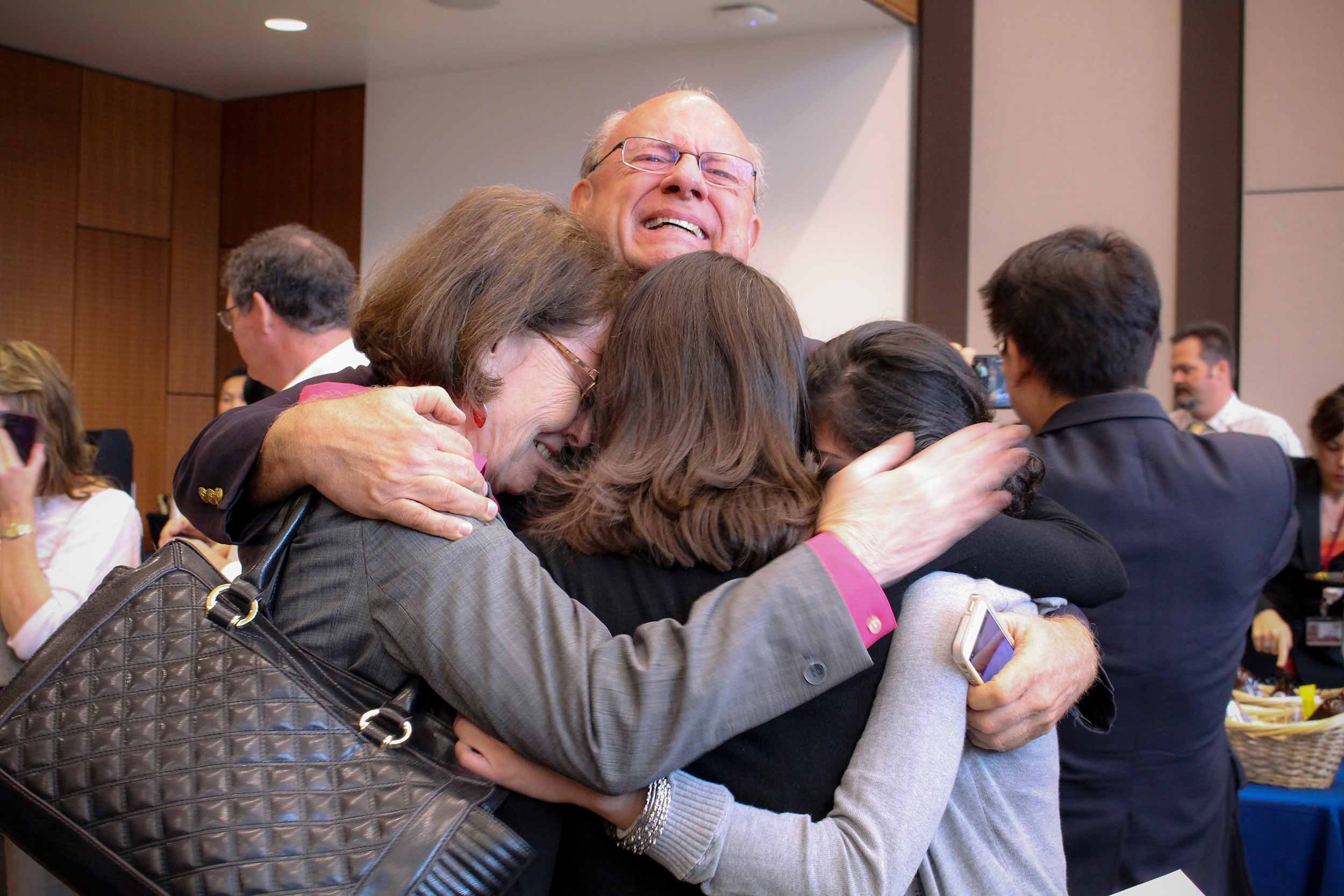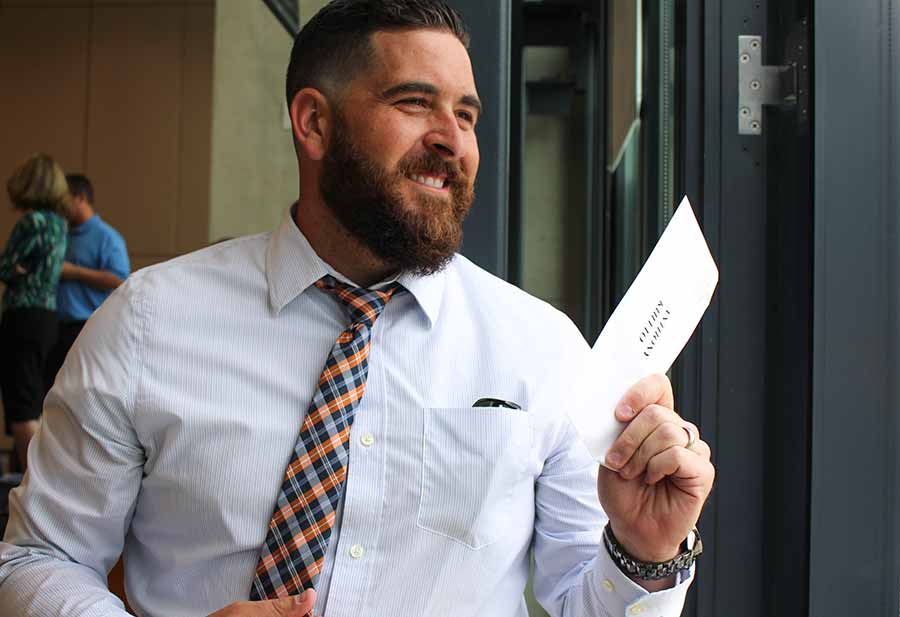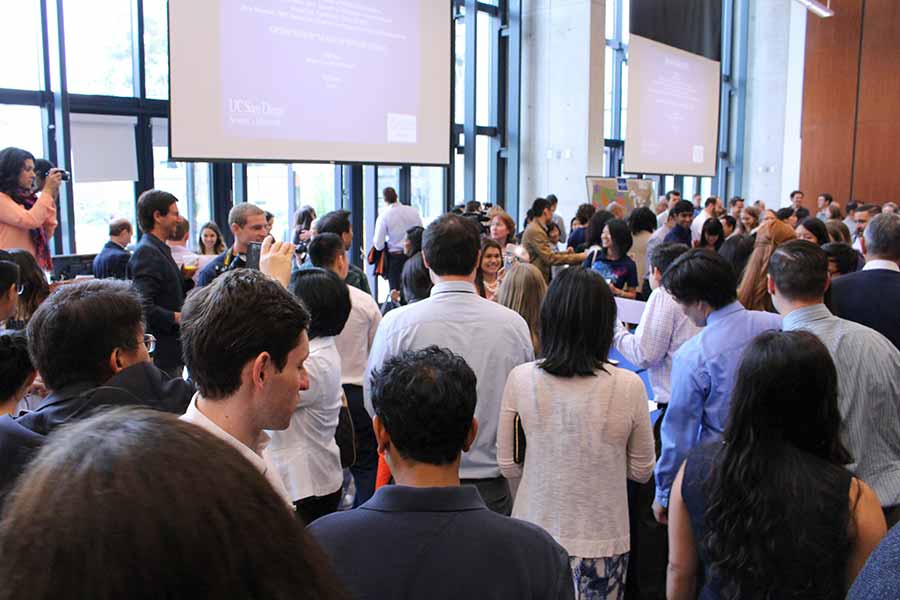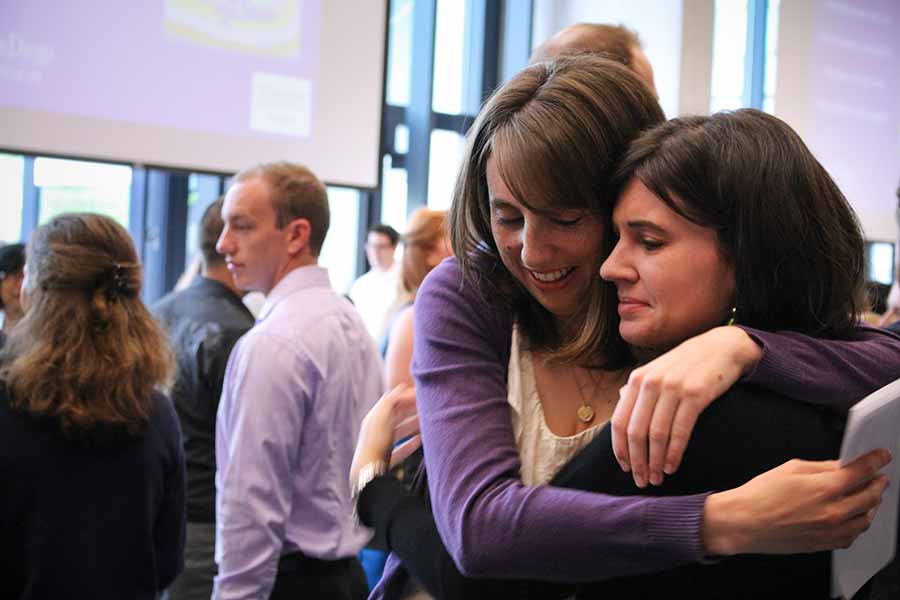By:
- Bonnie Ward
Published Date
By:
- Bonnie Ward
Share This:

Medical Students Learn Residency Fate at Match Day
The Oscars haven’t got anything on the suspense and excitement of this envelope opening ceremony.
There were smiles, gasps and a few tears March 20 as 115 UC San Diego School of Medicine graduates tore open envelopes revealing their fate for the next three to seven years.
This annual rite of passage, known as Match Day, informs thousands of medical school graduates across the country where they will spend their medical residency. In the minutes leading up to the big reveal, family and friends gathered in the Medical Education and Telemedicine building to scope out labeled envelopes on a big, blue table, stare at a map that would soon be filled with pins marking next stops and anticipate a celebratory sip of champagne.

Among the participants was Beth Griffiths, who decided to become a doctor at age 13 when her mom was diagnosed with breast cancer; Thomas Onyia, an immigrant from a struggling family in Central Africa who hopes to take part in surgical outreach programs to help underprivileged people in developing countries; and Anthony Kuleto, who worked as a Navy bomb diffuser in Iraq before receiving a Navy-sponsored opportunity to attend medical school.
All three joined their classmates at the festive Match Day event. “We are all incredibly proud of you,” said Dr. Maria Savoia, dean of medical education, in opening remarks. “We know you are going to do great things in the world, and we’re thankful that you shared this time with us.”
Then the moment arrived: Graduates ripped open their envelopes.
“I feel great,” said Onyia after discovering he got his wish to do his residency at UC San Diego. “The best thing about it is that I have great mentors here who have supported me throughout the process.”
Graduate Jamie Knell was also thrilled at her news. “I’m going to Brigham and Women’s Hospital in Boston, where I’ll do general surgery,” she said, acknowledging that it was her first choice. “I’m very happy.”
The event culminates months of interviews and applications by fourth-year medical school students, each of whom likely visited many hospitals or other institutions across the country in search of the perfect residency.

Here’s how the process works: Each student ranks their choices and medical institutions do the same. The lists are submitted to the nonprofit National Resident Matching Program, which crunches the numbers using a special algorithm to compare lists and possible combinations. Ultimately, the NRMP computer produces a single residency location for each matched student.
While announcing the residencies simultaneously at medical schools nationwide may seem unusually dramatic, the practice has a long history and a practical purpose. It was established in 1952 at the request of medical students to provide an orderly and fair mechanism for matching applicants with U.S. residency programs. Prior to that time, matches occurred via a decentralized, competitive market approach, which created intense competition between hospital programs and scheduling and other problems for applicants.
For Onyia, the reasons behind Match Day are secondary; he’s just joyous to be here. Onyia came farther than most – both literally and figuratively to arrive at his moment – immigrating to the U.S from Central Africa in 2003.
Initially, he spoke only halting English, but feels blessed that he had the encouragement and support of his cousin, an emergency department physician in Los Angeles, with whom Onyia stayed after arriving in the U.S. Onyia attended community college in Torrance and got a job selling women’s shoes to pay for tuition and other expenses. He eventually transferred to UCLA, where he earned his bachelor’s degree in microbiology, immunology and molecular genetics before being accepted to the UC San Diego School of Medicine.
During his years here, Onyia, who plans to become an anesthesiologist, was part of the University of California’s PRIME-Health Equity program, designed to train physicians to serve at-risk populations. As part of the program, he extended his education by additionally earning MPH/MBA degrees from Johns Hopkins University between his third and fourth years of medical school. “My career goal is to travel to Africa and other developing countries with surgical outreach programs to help people who couldn’t otherwise afford care,” he said adding that health care is a luxury in his rural community near Cameroon.

Griffiths, 26, also hopes to make a broader impact. As a kid, she loved science and also had a strong desire to help people, but didn’t know how she would combine her two major interests until her mother’s breast cancer diagnosis when she was 13. During that “intense year” when her mom’s cancer was successfully treated, Griffiths was inspired to study medicine. “I saw how doctors could impact people’s lives by being compassionate, caring and competent.”
Griffiths also developed an interest in health care public policy and has served as the medical student representative on committees of the California and American Medical Associations. She was also one of six students selected for the University of California – Robert T. Matsui Foundation Congressional Fellowship, which she did in 2009 during the passage of health care reform.
Griffiths will graduate with an MD-MPH and plans to go into internal medicine and primary care, while also continuing to do public policy and advocacy work. Her mom and dad were there to celebrate with her on Match Day as she happily learned of her residency placement at UC San Francisco Medical Center.
Graduate Anthony Kuleto, a married father of two, was a Navy explosive ordinance technician trained to diffuse bombs before being one of only two applicants selected from a pool of 2,000 senior enlisted sailors given the opportunity to attend medical school, sponsored by the Navy.
His interest in medicine started in Iraq as he witnessed lost limbs and other injuries among fellow bomb squad members. “I’d see guys that I came up with get hurt and going through recovery and see how a medical team was so important to helping them get back to a functional life.”
A 15-year veteran, Kuleto initially planned to be a military physician in the field, but found that he most enjoyed his pediatrics rotation in medical school. “Maybe it’s having kids myself,” he said, referring to his two boys, ages 8 and 10. “I feel like I can care for them in a way that you would want somebody to care for your kids.”
Kuleto, 36, plans to do a pediatric critical care fellowship at Balboa Naval Medical Center.
Share This:
You May Also Like
Stay in the Know
Keep up with all the latest from UC San Diego. Subscribe to the newsletter today.



